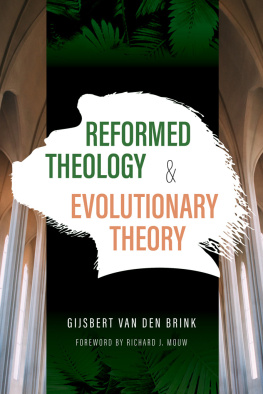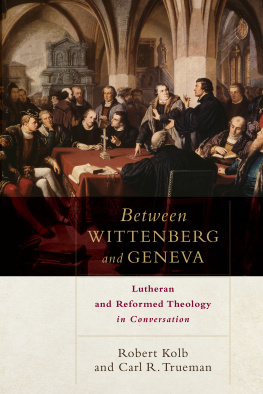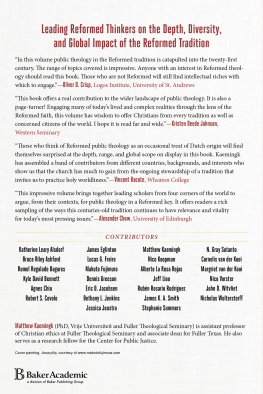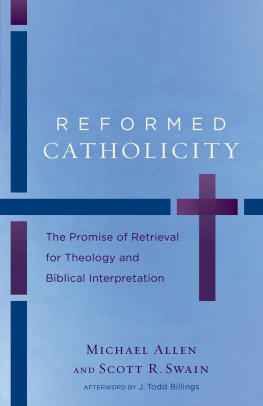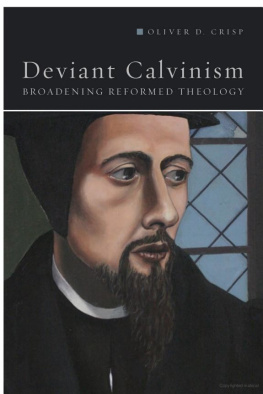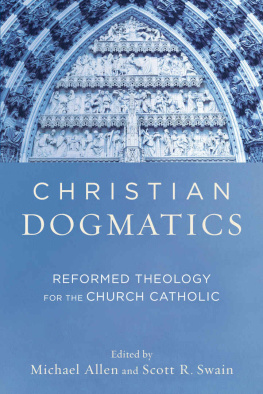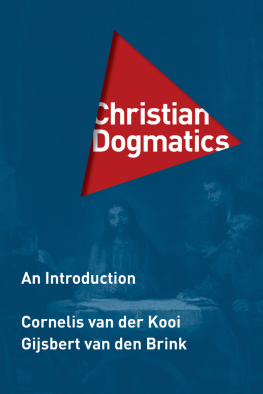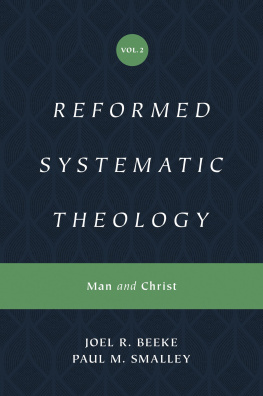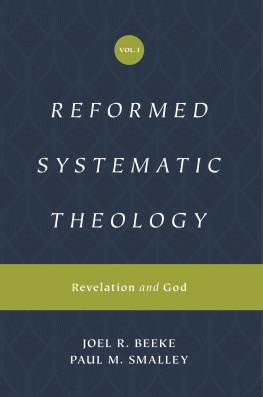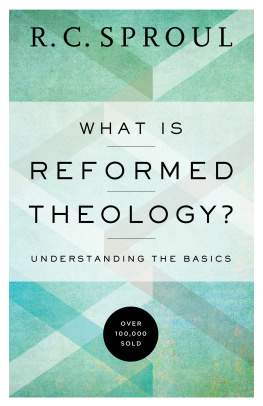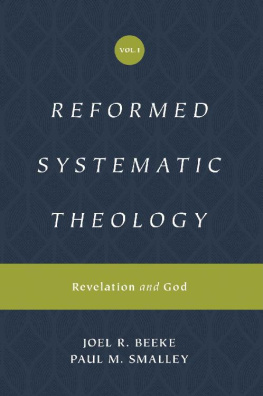Gijsbert Van den Brink - Reformed Theology and Evolutionary Theory
Here you can read online Gijsbert Van den Brink - Reformed Theology and Evolutionary Theory full text of the book (entire story) in english for free. Download pdf and epub, get meaning, cover and reviews about this ebook. year: 2020, publisher: Wm. B. Eerdmans Publishing, Co., genre: Religion. Description of the work, (preface) as well as reviews are available. Best literature library LitArk.com created for fans of good reading and offers a wide selection of genres:
Romance novel
Science fiction
Adventure
Detective
Science
History
Home and family
Prose
Art
Politics
Computer
Non-fiction
Religion
Business
Children
Humor
Choose a favorite category and find really read worthwhile books. Enjoy immersion in the world of imagination, feel the emotions of the characters or learn something new for yourself, make an fascinating discovery.
- Book:Reformed Theology and Evolutionary Theory
- Author:
- Publisher:Wm. B. Eerdmans Publishing, Co.
- Genre:
- Year:2020
- Rating:5 / 5
- Favourites:Add to favourites
- Your mark:
- 100
- 1
- 2
- 3
- 4
- 5
Reformed Theology and Evolutionary Theory: summary, description and annotation
We offer to read an annotation, description, summary or preface (depends on what the author of the book "Reformed Theology and Evolutionary Theory" wrote himself). If you haven't found the necessary information about the book — write in the comments, we will try to find it.
Reformed Theology and Evolutionary Theory — read online for free the complete book (whole text) full work
Below is the text of the book, divided by pages. System saving the place of the last page read, allows you to conveniently read the book "Reformed Theology and Evolutionary Theory" online for free, without having to search again every time where you left off. Put a bookmark, and you can go to the page where you finished reading at any time.
Font size:
Interval:
Bookmark:

Reformed Theology
and Evolutionary Theory
Gijsbert van den Brink
WILLIAM B. EERDMANS PUBLISHING COMPANY
GRAND RAPIDS, MICHIGAN
Wm. B. Eerdmans Publishing Co.
4035 Park East Court SE, Grand Rapids, Michigan 49546
www.eerdmans.com
2020 Gijsbert van den Brink
All rights reserved
Published 2020
262524232221201234567
ISBN 978-0-8028-7442-9
eISBN 978-1-4674-5876-4
Library of Congress Cataloging-in-Publication Data
Names: Brink, Gijsbert van den, 1963 author.
Title: Reformed theology and evolutionary theory / Gijsbert van den Brink.
Description: Grand Rapids : Wm. B. Eerdmans Publishing Co., 2020. | Includes bibliographical references and index. | Summary: An intermediate-level book on how evolutionary theory conflict or agrees with important Christian doctrines Provided by publisher.
Identifiers: LCCN 2019026837 | ISBN 9780802874429 (paperback)
Subjects: LCSH: EvolutionReligious aspectsChristianity. | Reformed ChurchDoctrines.
Classification: LCC BT712 .B75 2020 | DDC 261.5/5dc23
LC record available at https://lccn.loc.gov/2019026837
Unless otherwise noted, Scripture quotations are from the New Revised Standard Version of the Bible, copyright 1989 by the Division of Christian Education of the National Council of the Churches of Christ in the U.S.A., and used by permission.
Contents
In 2015 Gijsbert van den Brink was appointed by Amsterdams Vrije Universiteit to the newly established University Research Chair for Theology and Science. I was pleased when I heard the news of this new assignment. I was an admirer of Professor Van den Brinks scholarly achievements, and I had discussed faith-and-science topics with him on several occasions, so I knew that he clearly had a strong interest in those matters. Up to that point, however, I had associated him with his important work in traditional topics in systematic theologypneumatology, imago dei, providence, and biblical authorityas evidenced in his 2012 Christelijke dogmatiek. Een inleidung, coauthored with Cornelis van der Kooi. That book quicklyand surprisingly, for a work in systematic theology in the Netherlandswent through several printings, and then was published in an English translation by Eerdmans five years later, as Christian Dogmatics: An Introduction (2017). While that volume covered much fascinating theological territory, it understandably gave no sustained attention to evolutionary thought and other related scientific matters.
When I learned, then, of the release by Van den Brink of a new book on faith and science, I assumed that he would be offering helpful initial insights into an area of thought that he was only beginning to explore with sustained scholarly seriousness. Given that expectation, I was taken aback by the depth and range in this important book. He covers an amazing range of scientific topics in these pages, including suffering and death in the animal kingdom, common human descent, natural selection, the age of the earth, Middle East culture, and cognitive science. His grasp of details in these areas is impressive. And at key points he supplements his treatment of theological and scientific issues by drawing upon some of the technical discussions of scientific methods and theories in recent Anglo-American analytic philosophy.
One of the complaints often raised about discussions of faith and science is that the theologians who address these matters frequently have little more than a novices grasp of the sciences, while the scientists who weigh in on the issues often know very little theology. There have been, of course, some notable exceptions to this pattern, and now this book sets some new standards for evaluating these efforts. Van den Brink has clearly done his homework in both areas, and his past in-depth explorations of theological matters clearly serve him well in this book.
Those who know the authors previous theological writings will not be surprised that he is explicit about his identity as a Reformed scholar. But the non-Reformed should not avoid reading the book for that reason. For one thing, he offers a compelling case for seeing the Reformed approach as a stance rather than as a closed system of doctrines. Nor does Van den Brink, in making use of Reformed themes, focus on the more soteriological teachings associated with classic Calvinism: this is not a book that argues for predestination, election, limited atonement, and the like. In detailing the theologically relevant themes for a dialogue between theologians and scientists, he highlights the doctrines of creation, original sin, the image of God, divine providence, human volitions, and the incarnationall subjects that are surely important for exploring the relevance of a variety of confessional traditions for scientific inquiry.
It is sometimes said that the North American evangelical debates regarding faith and science have been shaped by public controversies that have not figured largely in British and continental European religious life. There is something to be said for that contention. The nineteenth-century Darwinian controversies in major American denominations, the Scopes trial of the early twentieth century, the often passionate anti-intellectualism of frontier revivalism, and recent local political debates about the teaching of scientific theories in public schoolsthese developments certainly have given expression to distinctly American moods and pieties.
However, Van den Brinks book, while written originally for a Dutch readership, also has profound significance for our own North American context. His openness to key elements in evolutionary thought, for example, has been condemned by representatives of his own orthodox wing of the Dutch Reformed churchesfolks who in the past have owned him as one of their most capable theological defendersin language not unlike that of many North American young earth proponents. And it is precisely the familiarity of that kind of response that makes this book such a valuable resource for those of us who are committed to preserving the basics of theological orthodoxy while wanting to honor the careful scientific study of created reality.
For me personally, reading Gijsbert van den Brinks profoundand, I would insist, groundbreakingstudy of faith and science has been an illuminating intellectual adventure. And while it has stretched my thinking, it has also encouraged me in my journey of faith. This splendid book is a gift to all of us who want to be open in new ways to how, in Van den Brinks words, the unspeakable glory and majesty of God are underlined by the evolutionary history of the world.
Richard J. Mouw
It has been a privilege to work on this book with so many supportive colleagues and others encouraging me to write it. I conceived it and began drafting it during a residential year (20102011) at the Center of Theological Inquiry (CTI), Princeton, New Jersey, as the Houston Witherspoon Fellow for Theology and Science. I am greatly indebted to the centers then directors William Storrar and Thomas J. Hastings, and to their assistant Jeanie Mathew, for their hospitality and encouragement, as well as for the many opportunities they created for dialogue and interaction. My fellow members at the CTIAnn Astell, Brian E. Daley, SJ, and Ola Sigurdsoncontributed to this dialogue and interaction in all sorts of fruitful ways, as did J. Wentzel van Huyssteen, then professor of theology and science at Princeton Theological Seminary, who showed a keen interest in my work during this year and beyond.
I am grateful to the Templeton World Charity Foundation (TWCF) for allowing me to pursue this project as part of the research program Science beyond Scientism (SBS) at the Abraham Kuyper Center, Vrije Universiteit, Amsterdam. The views expressed in this book do not necessarily reflect the opinions of TWCF, but I probably could not have written this book without their support. I am grateful to all those involved in the SBS program who read and commented on drafts of several chapters or on the whole manuscript: Leon de Bruin, Cornelis van der Kooi, Rik Peels, Jeroen de Ridder, and Ren van Woudenberg. I learned much from their invaluable comments and recommendations, which helped me improve the manuscript considerably (of course, I am myself responsible for any remaining infelicities).
Font size:
Interval:
Bookmark:
Similar books «Reformed Theology and Evolutionary Theory»
Look at similar books to Reformed Theology and Evolutionary Theory. We have selected literature similar in name and meaning in the hope of providing readers with more options to find new, interesting, not yet read works.
Discussion, reviews of the book Reformed Theology and Evolutionary Theory and just readers' own opinions. Leave your comments, write what you think about the work, its meaning or the main characters. Specify what exactly you liked and what you didn't like, and why you think so.

